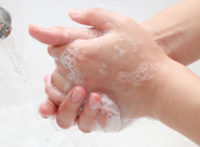How important is it to practice proper hand washing techniques?
One of the biggest problems with not washing our hands after using the bathroom is that throughout the day we touch many things. Other people then touch these things and when we then touch our nose or mouth, we pick up infections. As well as this, if you prepare foods with dirty hands, people can catch infections by eating what you have made.
Below are listed some of the infections and diseases which can be spread by not washing your hands thoroughly after using the bathroom.
Noroviruses
Norovirus is the most common cause of viral gastroenteritis in humans and it can affect people of all ages. It’s transmitted when people don’t wash their hands and worryingly, they can spread very quickly within large groups of people in close quarters. This is why when one person gets ill, entire households or offices often catch it too.
The best way to stop noroviruses from spreading or occurring in the first place is to wash your hands thoroughly after using the bathroom, before preparing food and to avoid touching your nose and mouth.
Airborne illnesses
Respiratory illnesses are usually spread via droplets which are breathed, sneezed or coughed into the air by someone who has the illness. While sneezing and coughing help to spread illnesses, poor hand washing techniques are a big culprit as well.
Common respiratory illnesses caused by poor hand hygiene include the common cold, influenza, chicken pox and meningitis.
Nosocomial infections
We often hear of infections being transmitted in hospitals and this is often the result of staff and patients not washing their hands. Naturally there’s a huge amount of infections present hospitals and if staff don’t wash their hands between seeing patients or if people with an infection aren’t practicing good hand hygiene, they can very easily pass their illness onto others.
Some of the most common nosocomial infections which can be spread by germs and bacteria on our hands include MRSA and E.coli.
Hepatitis A
Hepatitis A is a viral infection which can cause severe symptoms including problems with the liver, jaundice, abdominal pain, fever and fatigue. It’s often spread via food which has been contaminated by people preparing it who haven’t washed their hands after using the bathroom.
According to the National Institute of Allergy and Infectious Diseases, digesting even microscopic traces of contaminated faecal matter can cause transmission of the disease.
Practicing good hand washing techniques is one of the easiest and most effective ways of preventing illnesses from spreading. This is something that is particularly important in the workplace where large groups of people can catch the same infection.
Source: www.initial.co.uk


